|
VISIT OUR MASSES and HOMILIES ONLINE! CLICK BELOW TO WATCH
St. Elizabeth of Ravenna Catholic Church
Reasons for an Annual Retreat
I propose that there are good reasons for making an annual retreat. It is a vital component of a life of balanced reflections. The time and place for such an undertaking may vary, according to your own likes and specifications. I always choose July, because things seem to slow down at mid-year and there’s no pressing personal reason for celebrating July 4th. Also, and perhaps no one else has such a reason, I find more ripe berries during this period than any other – and eating local produce establishes for me a communion with the particular locality; this certainly applied when making wilderness retreats. In our spiritual development, we wish to observe how things are going with the Lord, and an annual period for such reflection can become a necessity if we take personal development seriously. How am I doing? And how does this manifest an advance in experience and growth over last year? Thus, a regular annual period is a good gauge from year to year and is worth considering in our annual budget of time.
A retreat is a deliberate pause, for both activity and rest must have their moment – and a retreat may be regarded as a restful opportunity. This time for retreat is not just a mid-life necessity, but also continues in older age, for progress is a life-long undertaking. Yes, retiring from such activities is for the birds; we may change the activities, but even older age requires effort and attention, for it can be a challenge. My mother always said “It’s hard to get old,” and she had a point. In fact, our improvement really requires more care and attention as we age, for the weight of past experience grows with time. Certainly, new aches and pains may tempt us to avoid reflection. However, we need to remind ourselves that gratitude should grow over our fading span of mortal time. Thus, with advancement in age, a review of what has gone before and what is to come grows in importance.
In moments of exhaustion, we search for excuses to cut our service time given for others. Here can be a good reason for reviewing changing attitudes. Certainly, the energy and enthusiasm may wane and must be compensated – and this becomes a challenge in itself. We speak to the Lord and seek out acceptance of emerging limitations and what they mean for us. We are who we are, and our time is God’s gift amid all its limitations. Without the Lord’s help we can become frustrated, but with it we discovery humility; the little we do can be the best we can do, God willing. Each succeeding retreat helps us realize how much we depend on God for achieving any efforts. A cooperative spirit is called for, and our dependence on grace grows with time.
The retreat is that opportunity to review our journey, and to open ourselves for what lies ahead. Are we like deer yearning for the fresh running streams? Does what is to come energize us to simply be who we are before the Lord? The annual retreat pattern may differ for individuals, some of whom demand a more social setting; some prefer assistance from spiritual directors or the stimulation of a preached retreat. Mostly, I prefer to take the time to speak to the Lord, without the assistance of others. A retreat can be a period of conversation with God, and part of this involves listening; just let the Lord speak and be attentive. Above all, arrange a time for such a conversation, for we all need the pause that refreshes in our journey of faith.

Viola, Red River Gorge, KY.
(*photo credit)
July 1, 2022 Discovering America's Community Relations
Today is Canada Day, and we join in celebrating with our northern neighbor. In fact, in July we focus on community or neighborly relations. Our vacations, retreats, festivals, fairs, and family reunions become opportunities for improving relations. Why let other forces damage these relations? Why be bullied by the NRA? Why tolerate billionaires throwing their money round in undemocratic ways? Yes, such questions could be rather a propos, but they do not lead to the betterment of community relations. Anger swells among interest groups and it makes for bad picnic and neighborly gatherings.
On the other hand, as we celebrate the Fourth this weekend, perhaps the better approach is to be more compassionate through looking at positive aspects of the American experience and our traditional values worth emphasizing: courage in the face of adversity, tolerance towards others, hospitality towards newcomers, fairness in the treatment of all, and a federalization that will ultimately lead to global controls of environment and finances.
Courage in the face of adversity could be aroused when thinking about bullying within America through a plentitude of guns and NRA and militia stances. It takes courage to be gunless in the American armed camp in which we find ourselves.
Tolerance towards others, whether on the so-called left or right, or the red or blue states, includes accepting neighbors and loving them for what they are; we must not become enemies of those who think differently on religious, economic, or political issues.
Hospitality is an American characteristic either shown when Native Americans welcomed the first Europeans to our shores, or the new nation that encouraged immigration as a means for the improvement of our own country and giving new life to others.
Fairness means that we as a people will take care of those who are socially or economically downtrodden and give them proper food, housing, and health care. This delicate condition of caring for the needy can be damaged when some take unfair advantage in circumstances when they are not in need, or are unwilling to work for their food and health benefits. On the other end of the economic spectrum, some pay far less in (or no) taxes because they have power to influence legislation for their own selfish benefit.
Federalization is the most difficult characteristic, for some do not want to expand beyond the thinking of 1787, as though the world stopped at the Constitutional Convention. The event of our coming together as colonies to make a country now requires a world movement to address ill effects of globalization: environmental pollution, maritime piracy, escape industries, and tax havens.
Prayer to Restart Faith Journey: O Holy Spirit, quicken us enough that we can begin this coming half year with the same freshness that we began in January. Inspire us to see each day as a new beginning, especially during these trying summer months. We get tired as routine takes its course; you are the one who can reoil our gears; help us see that this work is undertaken for God's glory, and only a shrinking precious span of time remains.

Hiking Buffalo Mountain (TN) for view of windfarm.
(*photo credit)
July 2, 2022 Creating Justice for All
I pledge allegiance to the flag of the United States of America, and to the Republic for which it stands, one nation, under God, indivisible, with liberty and justice for all.
As we approach July Fourth, we ought to reflect on those aspects of our democracy that we take for granted, and which parts are still in process, or have been neglected out of smugness. Bill Moyers calls our Pledge of Allegiance written above a "whopper of a lie;” we do not give justice to many, including those on death row, or the forgotten poor as we kowtow to pressure from wealthy plutocrats. His listing of imperfections of our criminal justice system is valid to a point, but is the Pledge a lie?
Our Pledge of Allegiance can be looked at in various ways. It could be regarded as a statement of triumph and self-righteousness. In this regard it resembles the rather offensive question we may be asked by local evangelists: "I am saved, are you?" We respond that this sounds like a state of sinful presumption just as devoid of the virtue of hope as is the utterance of a despairing person wanting to end it all. Neither wants to work for salvation, which is a pledge we take to act in hopeful ways. The pledge to improve extends to the allegiance to the flag. We are not the privileged, boasting of our righteousness to the rest of the world that lacks a powerful nation. It is our true pledge to become a free and just land for all -- and we know we haven't arrived yet.
Moyers' arguments are powerful and I could be emotionally aroused to say "amen" except for one thing -- this Pledge is an ongoing process, not a statement of some concrete status quo. We can say there is a waving flag, a United States, a nation that is quite powerful and hopefully indivisible (provided the "Big Lie" adherents do not break out in revolt). We do have a commitment to liberty in many ways, though at times our religious liberty seems to be challenged by federal rules and regulations. But what about justice for all? Is it an accomplished fact?
We are plagued with unfairness in the weak and underfunded court system that does not give adequate legal defense of the poor and neglected. We observe billionaires who throw their money around as though it is their right to decide governmental policy because they are rich enough to buy the system. Yes, justice postponed is justice denied, and so we must work all the harder to see that lack of justice by founding fathers towards slaves, or indentured workers, or Native Americans or women, has been corrected over time and at great price. The process is not complete as we all know, but to pledge for justice is not a lie; we mean we are pledged to make it happen. Bill Moyers uses strong language, but this triggers us to look more humbly at where we are as citizens of this imperfect republic.
Prayer in Sunlight: O God, in creating us you placed us on this planet that revolves around what St. Francis calls Brother Sun. We see light, we feel heat, we know that we can glory in sunlight, which triggers the Vitamin D needed for our proper health. Our sun can tan us, burn us, and even harm us when exposed for too long. Help us, Lord, to respect such powerful creatures; may we enjoy the sun and still shade ourselves from too much in these long sunny days.

Canada's Athabasca Falls.
(*photo credit)
July 3, 2022 Exploring Ways to Peace
Whatever house you go into, let your first words be "Peace to this house!" And if a man of peace lives there, your peace will go and rest on him; if not, it will come back to you. (Luke 10:5-6)
On the Sunday within the July Fourth weekend, we reflect on the many times Jesus said to his disciples, "Peace be with you." This peace was emphasized after his passion and death when he reappeared in his resurrected form. What the above passage indicates is that peace is a gift that comes and must be received in order to have an affect on the recipient. The gift is there and cannot be tarnished by another, for the giver has a retained peace for future use. Let's view peace from many angles:
Peace is a divine gift to those who have "peace of soul." It is highly possible that some people are agitated and endure desolation due to their own fault or as a testing by God. Others live the good life as best they can in a peaceful manner.
Peace is a fruit of the Holy Spirit (Gal. 5:25). We are grafted into the true vine, the Prince of Peace. In the Spirit we walk and have our being.
Peace is a fruit of charity along with joy and mercy. It is what St. Augustine says about love, the fulfillment of all of our works. There is the goal; that is why we run; we run toward it, and once we reach it, there we shall find rest.
Peace is a state of balance and harmony for individuals and groups. We experience what constitutes our own sense of peace. We can also speak of communities and nations that are at peace through justice for all, whether achieved or pledged and in process.
Peace is an urging for something more. We are invited to grow in peace at different times and places, such as at the Liturgy itself. We eventually realize that there are degrees of peace and so the hope is that this peace can deepen with time.
Peace is perfected by our action. We can make or disrupt peace. Peace is of divine origin, but we can enhance or degrade its quality according to the manner we choose to live. It is not something "out there" that is immutable, but rather can be shaped and fashioned according to the peacemaker's determination.
Peace is given as well as received. The quote above tells us that our peace returns if not received properly, and we will know when this is the case.
Peace is freedom from the bondage of war. We must work for global peace and removal of strife among or within nations. Since struggles continue to occur, we must work for the realization of global peace so that authentic development may occur.
Peace is fragile and must be protected and treated with care. We understand that our efforts to be peacemakers and protectors of peace require divine assistance as well as our human effort.
Saint Thomas, Apostle: You struggled with coming to the faith, but once convinced, you gave your entire life to the spread of God's word. In fact, no other apostle left the legacy of a Church that has existed for 2,000 years, like yours in India. Teach us to overcome our doubts, and to grow in faith even without the opportunity that you had to touch Christ's wounds. May we seek to carry this faith forward into the future.
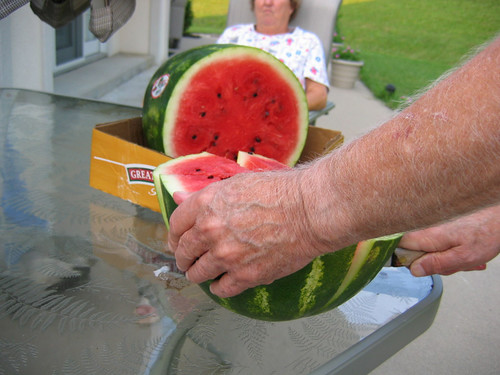
Fresh watermelon for holiday gathering.
(*photo credit)
July 4, 2022 Expressing Love for Our Country through Deeds
As we celebrate this Fourth of July, it may be wise for us to see our country in a familial manner -- as a loved one, filled with wrinkles that are accepted as well and sometimes overlooked for the sake of household tranquility. Patriotism involves love and a willingness to sacrifice. To love is to learn, to be in sympathy with, to know our divisions, and to pray that we overcome them.
Learn about our country: Learn the length and breadth of our land. Too often people know their locality and little more. I went to school with a New Englander in New York City who truly believed that Buffalo was where the beasts by that name roamed on the expansive prairie somewhere beyond the Hudson River, beyond which he had never cared to venture. To know our states and how they are shaped, and which states they border, is all part of a geographic knowledge that we achieve as citizens; to travel about opens us to the American expanse.
Defend our country: This involves a continuation of those who were willing so many times in the history of our country to come to the defense of values held dear. We wonder whether we may be called to defend our land against the adherents of the Big Lie. Many may have to rise to the call to duty, whether working for the government or just ordinary people. Law enforcement people take great risks for the citizenry; parents, educators, and caretakers in hidden ways help guide our country's law-abiding citizens.
Be Compassionate for our country: Many citizens struggle with health problems, economic difficulties, poor family relations, employment dislike or lack of, and a failure to see a bright future ahead. We know that the aggregate of all these heartaches amount to a national mood of not being as successful as we dream -- perhaps the calling into questions of the American dream. This may lead to either of two extremes: a national sense of desolation and even despair; or with God's help a deepening sense of love and spiritual rebirth making us ready to effect economic renewal. We may escape and neglect others' essential needs, or come to a love that leads to beneficial deeds for the Common Good.
Know our country's needs: We stand at a moment of change in a spiritual dearth, in the way we view future, in the commitment to give health care to all, in a need to help a world to change its environmental policies in order to curb climate change, in the way to welcome migrants into full citizenship, in control of the guns that are all about, in addressing our persistent drug problems, and in furnishing adequate nutrition to all our people. These are tall orders and require an aroused citizenry, not selfish individualized people thinking only of their own welfare, apart from essential needs of others.
Prayer for Interdependence: O God, who created us in love and mercy with free will, beckon us Americans to celebrate our blessings of life, liberty and pursuit of happiness on this Independence Day. You nourished our forebearers with grand thoughts of freedom, though we are still in process of securing a deepening respect for citizens of diverse ways and cultures. Challenge us to become ever more responsible to the needs of those Americans who are poor and lacking essentials of life. Purify us of a false sense of privilege and special treatment. May we again celebrate what brought us together as a people; may this become the rationale to bring forth global collaboration and confederation.

Chimaphila umbellata, pipsissiwa.
(*photo credit)
July 5, 2022 Purging Military Terms from Our Vocabulary
Sister Paula Gonzalez once told me after one of our joint conferences that she thought my language involved too many military terms. She did not give examples, but I began to reflect during that period on what I was saying and images used.
A moment for additional reflection. So often our language betrays our inner self, and I testified that I did not want to be competitive, and yet mine was a story of struggles and conflicts in which I was engaged with all the tactics and plans used in combat campaigns. These are simply not part of the vocabulary used by peace-loving people. I never liked the term of "God's marines" for Jesuits and regarded myself as a peaceful person, but the terms used may have told more of what was there in the heart.
Our culture is militant in language and that tells us more than what we want to hear, when our military budget almost equals all the rest of the world combined. For outsiders, here are some of the terms we use: the big gun is a successful leader or very important person; to trigger is to initiate a process in some fashion; a clean bore where no obstacle is present; a straight shooter is someone who tells it with no frills attached and he or she often hits the mark; a smart gun is one who is experienced with the ways of the world; to target another person or thing is to focus attention on a particular individual; a white flag is to seek a pause to talk in some sort of disagreement; to come with guns loaded means to be prepared for a given contest with proper information at hand; to exchange fire is to engage in discussion with some biting barbs involved; to cease fire is to halt the discussion for a period; to be in the trenches is to be in the middle or thick of a controversy; to look down the barrel is to show a willingness to take up a controversy; to take a bullet for somebody is to sacrifice by accepting blame for another; flash in the pan, means quick publicity for a person not known before; to muzzle is to compress or control; and in my sights is to be the focal point of someone else's expected action.
Discernment is necessary. We have to examine ourselves to change both language and heart. The language of peace comes with time and patience just as the cursing person needs to be mindful that it takes much to clean up foul language patterns. Need I see the exterior and interior world as not just warfare on Satan or armed fighters, but a deliberate movement to a language of peace? Instead, we should attend to an atmosphere of peace, serenity, calmness, sacred silence, and trust that positive results will surely come. In fact, choice of words and manner of speaking require effort and an adjustment, a putting of differences behind us in a quest for what is unitive and neighborly, with hope of building better community relations. A heart-felt peace-making takes time to develop. Yes, improved friendship involves turning spears into pruning hooks and language into words of comfort.
Prayer for Patriotism: Lord, some who are hypercritical may say to be patriotic is not something that is worthy of prayer. Are they right? We need to be patriotic in a good sense of full awareness that we have the responsibility to engage in civic duties needing fulfillment. Help us to love our country, overcome its imperfections and take its rightful place within the global family.
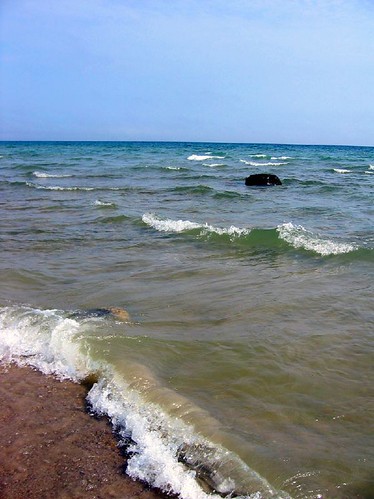
On the shore of Lake Huron.
(*photo credit)
July 6, 2022 Coming to an Understanding of What "Success" Means
A successful person is one who can lay a firm foundation with the bricks others have thrown at him. David Brinkley
Maybe that quote speaks of the common definition of "success," but is it right? We can all agree that Mother Teresa was a spiritual success, but there are a host of American idols or songsters who are known for a few moments and then forgotten. Were they successful? Does temporary popularity breed success? What about the individual standing before the judgment seat of God? Just how successful are we? Do we even judge success properly?
Are the contented successful? All of us at one time or other have been acquainted with an individual loved one or neighbor who has been a selfless caregiver for decades or endured abuse at the hands of another. We realize that they took their discomforts with equanimity or seemed totally unmindful of the discomforts of their often-shortened lives. They were happy people, were compassionate, overcame adversity without flinching, and even expressed gratitude for their lot in life. In our heart of hearts, we know they were "successful," though unrecognized by much of humanity. Their status was known to God alone -- and they were contented with that.
Are the discontented successful? There is a second category that may be classed as successful and may include these who build with thrown bricks. Often, we are reluctant to call them successful, since others take potshots at them. Our common characterization of success as being popular does not allow us to see that status quo breakers may not care about sticks and stones. Instead, these take a stance in direct opposition to popular belief, since that is the way change will ultimately occur. We ask whether Robin Hood could be a saint or whether Thomas Paine would win a popularity contest, and yet they may have triggered successful activities on the part of many. The prophet Jeremiah was no rousing success in the Israel of his day, and yet he told it like it was, and in due time was regarded as a great prophet.
Do measures of success need reevaluation? To be contented in a hidden way or to be discontented for a higher purpose tells us something about great people who were unknown or only recognized later. The story of Christianity is one of a notably unsuccessful itinerant preacher whose ministry was cut abruptly short for "the good of the nation." Yet today, Jesus Christ is proclaimed as Lord by over two billion people. Here, apparent lack of success becomes success in a longer term, for he is the master of all success. We are called to reevaluate those we regard as successful in the short span of one lifetime -- and see success as a long-term designation. If we heal our Earth, why give medals to some who do small things and fail at bigger ones? Maybe the social media and its immediate audiences are not good judges of who is a successful person.
Prayer for the First Tomato: Please, Good Giver of all good things, hasten these tomatoes along, or is that asking for an unneeded miracle? We take pride in ripe tomatoes by Independence Day; it's not always the case if subject to deer attack or other accidents. Now we await the fruitfulness, knowing that July has its blessings. Yes, let us avoid poisonous parts: leaves, roots, stem and even green unripened clusters. Lord, you give us the patience to expect the ripe and ready fruit, whether red or yellow or purple, and be glad when enlivened by the resulting fruit.

Corallorhiza maculata, spotted coralroot.
(*photo credit)
July 7, 2022 Anticipating an Energy Economy Minus Coal
Month after month, renewable energy sources continue to dominate the new electrical generating capacity being brought on-line in the United States. The path towards a zero-coal, zero-nuclear future becomes clearer with each new report. - Ken Bossong, Director, Sun Day Campaign
In 2022, we see changes that make us believe that energy independence is just around the corner, and we would like to think we can avoid a catastrophe of two-or-higher degrees of global elevated temperature. At the turn of the century, when American coal-fired plants were still furnishing half of our country's electricity, those of us in coal country could never conceive that changes could be so rapid. Coal was king, a position of prominence for a half century, and coal miners could retire with full assurances of well-earned pensions. All changed as loaded coal trains disappeared and coal companies went bankrupt and abandoned long-term commitments to rank and file workers -- but not to CEOs.
Unfortunately, the path ahead has rough patches; in 2020 the global carbon dioxide crept to 417 parts per million -- and then, even amid pandemic curbs, still rose to 419 ppm in 2021. Certainly renewables are coming, but not fast enough to counter the ever heavier demands for global energy using existing sources. On the brighter side, renewable energy (solar, wind, biomass, water, and geothermal) is now furnishing much, if not all, of the new U.S. electrical generating capacity -- and even out-competing cheaper natural gas resulting from fracking operations. Solar had a singular honor of being the primary emerging renewable energy source; and wind is close behind.
Since the last decade, further energy change is hastened as older coal plants are gradually retired or changed over to competitive natural gas. We can expect the 2% annual slippage of coal-generated electricity to fall below current 24% total amounts. Natural gas and renewables will pick up the generation capacity. Today renewables account for one-fifth of the total capacity, with gains expected during the rest of this decade. Some of these renewables, such as geothermal, have immense untapped potential.
On the other hand, nuclear with high initial costs, aging plants, and continuing safety issues will gradually decline as one by one the older plants are closed. However, the big loser will be coal within this decade. This is not due simply to stronger environmental restrictions, but more so to pure economics of cheaper gas and renewable energy sources becoming far more competitive. This could be a total win/win situation, if efforts are made to retrain coal miners for safer renewable energy jobs. Expanding coal exports is no environmental or economic answer.
Herbals Prayer: Lord God, your creative wealth extends to the many herbals, which we have learned to use for medical and culinary purposes. Some give us relief and comfort when enduring the daily pains of body. Even more, we plant and tend for the freshness of taste and smell that fills our kitchen. We can say in the fullest expression: these are "godsend." You know our needs and you give us added delight, all of which we receive with increasing gratitude. In fact, we grow in herbal appreciation with time and experience. Each herb teaches us simple gratitude.
Global Cooperation among Belligerents
A host of civic, humanitarian, scientific and technical activities involve members of the world community. We have witnessed a large number of restrictions covering a number of financial, commercial and other areas being imposed on Russia, a nation which has been a major contributor to the United Nations, G-20 and other cooperative groups. Is it satisfactory to say that some of these can continue even with the conflict between Russia and the Ukraine? Those who say it is possible, need only recall that no such cooperation occurred between Nazi Germany and the Allied forces during the Second World War. Maybe there were a number of such collaborative endeavors during the half century “cold war,” but the present conflict is not cold but “hot” in a limited way.
This is a time when the leadership of Russia is being accused of immoral acts worthy of prosecution by a World Court, genocidal acts that are of major import. It is not possible to ignore “political” ramifications if such actions on the part of Russia are occurring at this time. Some will argue that it is possible, but have no proof. The fact that numerous activities have been operating at the start of this year does not mean that these can continue under current hostilities. If there were diplomatic efforts at ongoing prisoner exchange and ceasing of active warfare, then some degree of hope may arise, but the accusations are so severe and the sanctions so pervasive, the attempts by neutral nations seem quite far-fetched. At this time with extended and even growing hostilities, one must realistically say – only in an atmosphere of peace can certain projects and programs be continued.
The Space Program has included massive interaction in both the maintenance of the space lab and the sending and retrieving of participants. This one would seem more likely to continue amid the period of conflict – but will it?
Refugee Facilities need not be politicized and so many of the camps and adjustment activities could continue, but here again some accuse others of turning such facilities into factional endeavors.
Climate Change Conventions are perhaps the most critical for cooperative efforts, with a shrinking window of time for curbing rises in global temperatures. Unfortunately, as we have mentioned earlier, the expanding of fossil fuel development and neglect to allow renewable energy substitution is working to the detriment of essential global collaboration.
Nuclear fusion research is a key area where immense outlays of billions of dollars have brought this to within thirty years of completion. The ten million components of the highly complex joint world facility at Saint Paul-léz-Durance, France, require thousands of companies and interactions, and current hostilities make it difficult to continue. Russia has been a major player in this operation and without continued interaction the work would grind to a halt. Here, more than any other of the areas just mentioned, the longer the delay in peace the harder it will be to resume normal operation.
For the sake of global collaborative efforts, let’s hope peace comes quickly between Russia and the Ukraine.
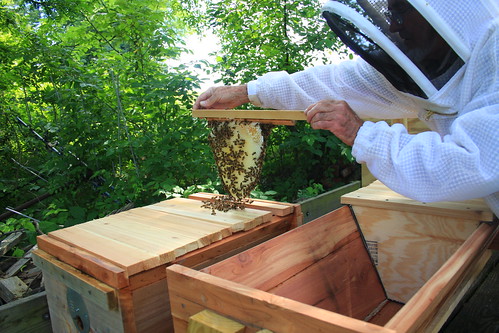
Finding new friends with the honeybees.
(*photo credit)
July 8, 2022 Revealing Wage Theft as a Major Problem
A poor laborer (often undocumented) is picked up at a Texas mall for day labor; he is regarded as an "independent contractor" and so there will be no taxes removed or workman's compensation, since this is normally furnished by independent "agents". In such situations, state and nation loses two billion dollars in taxes per year.
Stolen wages. There is another practice of even greater concern and a matter of simple justice -- and in the construction industry it is an arena of malpractice. Quite often the hiring company promises some sort of compensation and still only gives at best some small amount (say $5 an hour rather than minimum wages), with the rest to come later. The promise of the remaining wage is never paid and the hiring agency tells the worker to get lost. Such is the reality of working conditions, especially for illegal migrants who will not report the theft for fear of being deported. Thus, the onus of daily work being unpaid as promised surfaces as a reality that is hidden in this fair land.
Unfair business competition. Such thievery as just mentioned exists and, in such states where enforcement is loose, is raw reality. Those construction companies that follow rules, report and pay reasonable wages and pay taxes are at a disadvantage over those who play loose and get jobs done for less. If a group builds a house and skimps on labor costs then this will be marketed for greater profit than in states where most play by rules due to stricter enforcement of the law. Lax states can construct a comparable apartment for a lower price than a stricter state. Unjustly low wages in a foreign country have resulted in escape industries going to those lands -- is it thievery?
Unfair state-by-state competition. States that brag of being "business friendly" with reasonable housing prices for employees take advantage over others in the tight market for jobs and employment. If labor conditions are loose through lax rule enforcement, then the state has that business friendliness in part through the theft to its working class. What is called "friendly" only applies to the profit mongers, not to the people who are forced to work for unfairly low wages.
Labor Justice groups exist. With globalization we need union organizing and support (see tomorrow). Likewise, a variety of public interest organizations are associated with social, religious, and academic institutions. These are generally small and over-stretched in issues, but often have their ear to the ground as to labor theft. In certain instances, publicity causes the theft to be halted, rarely for laborers to be paid back. In virtually no instance is the actual thief caught and made to give compensation for misdeeds done. When you find local justice groups, give them support; when finding injustice, report it.
Summer Hiking Prayer: Lord creating God, you give us legs with mobility, eyes to see landscape, ears to hear the rustling of wildlife, noses to detect scents of summertime, tongues to taste the berries on the way, and hands to hold a walking stick. We are groomed to hike in your glory, O Lord, and to pause occasionally to say thanks for the opportunity to enjoy fresh air and sunshine. May we dispense gratitude, for that adds to the worthwhile venture before us. May this be part of our continuous journey of faith.

A quiet moment with the Trillium sessile in central Kentucky.
(*photo credit)
July 9, 2022 Supporting Labor Union Organizing Today
Americans often take labor unions for granted and forget how much they have benefited the working class, raising them from penniless to a middle class that is threatened today. Do I forget that my public interest roots were partly nurtured by the fruit of laborers? They contributed and built the CIO/AFL headquarters on 16th Street in Washington, DC, our first CSPI office space through the graces of Tony Mazzocchi's Oil, Chemical and Atomic Workers Union. They deserve our continued support.
Challenging labor union times are not just past history. Industrialization, with its horrible excesses in low wages and unhealthy conditions (and fires) still continues to plague garment factory workers in Bangladesh, and wage theft plague workers in our own country. Labor still experiences unhealthy situations that cry for a united voice to bring about better wages and working conditions, as became evident to those delivering materials during the height of the recent pandemic.
Laborers in distant industrializing lands are not the only ones experiencing poor laboring conditions. Many in this fair land also bear downward mobility through shifting corporations from one place to another. Globalization and the threat of higher costs for safer work conditions and wages permit the escapees of responsibility to shift from one place to another. In the 1970s, a nun organized workers here in Kentucky for better conditions; while strikers blockaded the front corporate door, trucks came in the rear and moved the machinery to a more complacent state. Laborers are victims to such callous corporate mobility.
Labor union membership has fallen to 21st century lows, especially in "right to work" states (where unions do not have power to oblige workers to pay dues) that now even include the auto union bastion of Michigan. Union membership is dropping in all industrialized nations (from about 90% in 1970 to 68% of total labor force in Sweden, and from 27% of America's four decades ago to about 10% today). It takes money to organize labor. Costs are borne in part by existing union members and that can amount to about $30 per month for those making a little above minimum wage. Benefits of union affiliation are not considered by workers seeking to avoid confrontation -- and especially knowing that mobile corporations can bankrupt or merge and abandon pensions.
An ideal would be if laborers owned the places where they work. Worker ownership keeps occupations stabilized in communities that have certain industries and services. However, the ideal is only in an elementary stage; capitalism still has a sharp claw on the throats of the world's laborers, whether in Western or Asiatic Communistic form. One answer is as in 19th century industrialized America: a strong labor union. We must speak out in the workers' defense when possible and encourage concerned citizens' support.
Retreat Prayer: Lord, the problems of life continue to mount on us; what looks like little things grow to monsters. Do I forget you in the heat of summer? Inspire me to come closer to you, who at times, seem distant. Allow me to see that now a retreat, a withdrawal is ideal. Help me find a perfect setting for solitude. Let this be a time to call out to you, for I need you close when distractions raise too many pointed spikes and spires. May I seek help to make this time a pause that refreshes.

Red milkweed beetle, Tetraopes tetraopthalmus.
(*photo credit)
July 10, 2022 Reflecting on the Good Samaritan Parable
When we are in trouble, we hope there are friendly neighbors to help us. The Good Samaritan story is presented once again, and each rereading allows us to probe into one of Christ's parables with its rich spiritual insight. Would that our personal stories had such a powerful appeal. Elements worth considering include:
* Affirm concern about another's wellbeing -- The first two (priest and Levite) passed by and denied even seeing the person; they did not want to be ritually contaminated. On the other hand, the initial thought of the Samaritan who saw someone in need was to stop and help. We must see authentic suffering and not allow ourselves to be blinded by current concerns and habits.
* Accept anyone as our neighbor -- We do not limit neighbors to those who we are close to by blood, locality, religion, ethnic background, economic status, or political influence. Someone is in need, even those with whom we may have had traditional hostility. Mother Teresa also taught us that all people who suffer are neighbors, but we must be willing to enter into the neighborhood of the suffering and to offer assistance.
* We give what we can -- Good Samaritans are those who go to the scene with the little that can be given, and yet do their best. In the parable the Good Samaritan poured oil and wine on the wounds of the victim. Some would hasten to remove themselves from a recognized crisis by simply saying they do not have the resources to do anything meaningful -- and turn away to be occupied by other things. We would not seek to escape the situation but be present.
* We share time for our neighbor -- The emergency care means stopping and getting involved, even though the initial impulse is to let others do the dirty work. As Christians, we accept that our time is the victim's time and thus a shared gift within a neighborhood. This tells us that sharing of time is what constitutes good neighborly relations. We accept that we are limited -- the opposite of excuse wherein we try to reason for not being neighborly. The neighbor is made to realize that we can only do so much, but it is truly from our heart.
* We are willing to follow through -- This last is often the most overlooked, for we have a bureaucratic streak in us to allow some other primary care person to take over. Do we limit neighborliness to delivering the victim to another for them to do the ministering? What we find so telling in the parable is that the Samaritan is willing to expend resources and offers to stop back and assist later if need be -- a mark of enduring concern and responsibility. That takes more than initial assistance.
The Good Samaritan: Lord Jesus, you are a master at parables and one of the greatest is that of being a good neighbor. You chose as subject a foreigner, a Samaritan, who was highly disliked by your listeners. The dangerous two-dozen-mile stretch from Jericho to Jerusalem was and is a frightful route with high cliffs on all sides and ideal hiding place for robbers. The person is left as half dead; the priest and Levite pass without stopping; a Samaritan stops, binds his wounds, takes him to an inn and offers to pay more if needed. Yes, Lord help us also to be neighborly.

Appalachian stream, eastern Tennessee.
(*photo credit)
July 11, 2022 Trying to Spell the Sound of Rushing Water
Water sounds that differ throughout the year intrigue us. Consider reading our available book Water Sounds (Marquette University Press). Water sounds must have delighted Pere Marquette or any adventuresome person exploring the great wilderness and Great Lakes region. All of us notice the variety of sounds that can come from moving water and how these may differ through the seasons. Yes, we are captivated by the rush of moving water -- flooding river, roar of the waterfalls, crash of waves, even running of water at a faucet or shower.
We try to imitate the sound of water and find it nearly impossible. We would at least like to spell it, but seem at a loss even in the clever paths of onomatopoeia (forming words by imitating the natural sound). Is it "gush," "guzzle," "trickle," or "swish"? Hardly. This puzzle comes back again ever since early youth during the lazy days of mid-July, when the world seemed to stand still even while living waters move on and on. Water reminds us that our dreams that mortal life stands still are all wrong. Water moves on even when we hope an enjoyable moment will pause for a while. Someday it will, but not now. Let's consider the secrets of the gurgling creek in Appalachian Sensations:
July -- Secrets of the Gurgling Creek
You set springs gushing in ravines,
rushing down between the mountains,
supplying water for wild animals,
attracting the thirsty wild donkeys;
near there the birds of the air make their nests
and sing among the branches. (Psalm 104:10-12)
What is the sound of rushing water? Does it start with "g" or "l" or maybe "b?" I am unable even to start to spell the sound of water rushing over rocks, although it certainly is a familiar sound. I strain and pause in utter confusion. Why must I spell the sound of rushing water? Is it not enough that I hear it, observe it, and allow it to enter me like the musical rhythms of my heart? Other creatures, the mice and the copperheads and the birds, know this rushing stream and yet do not attempt to spell it. They come to drink and maybe find something to eat. Let me pause as well, and enjoy the blessings of the gurgling stream without trying to rationalize the occasion. Must I give a name and control it by spelling the sound, or is it enough just to listen? Let this rushing stream penetrate my being without demanding extra effort; let it teach me to be satisfied with this precious moment for just what it is.
Prayer to Travel Lightly: Holy Spirit, keep us mobile and ready to go forth from our sitting place to spread your word. Let us make our journey with light hearts and light luggage. We always take too much baggage, and that hinders our focus on what is important. Too many things distract us from what we are trying to do; they weigh us down with extra concerns. You said to your apostles to only carry a walking stick and wear sandals, and that instruction has its translation for us today. Assist us to never be weighed down by material things, which always need attending.

Look closely. Megaphasma denticrus, Giant Walking Stick.
(*photo credit)
July 12, 2022 Making an Annual Retreat Is a Free Decision
While I look forward to my annual retreat, I do not like to impose obligations on loyal readers or friends. The decision needs to be part of one's life, or at least considered on those occasions when major decisions need to be made. The retreat is a span of time when we talk to God about our journey of faith and where we are at a given time. We do some of this on regular or routine periods in our life, but having an annual event allows deeper spiritual reflection to be something special at this time in life. It's hard to muster arguments for fulfilling any obligations; it is even harder to convince one to make a regular or annual retreat.
Free choice: Making a free decision is far better than feeling an obligation to make a retreat. We all have before us either short- or longer-term decisions and could benefit from a special prayer time, but many people reply that they talk to the Lord on an ongoing basis, and my imposing another "ought" on them is discomforting. Rather, I testify that many (perhaps not all) believers profit from such an annual review of their own journey. The readers of this essay are serious people who need the time to reflect in a busy world. Bikers often stop to take breaks; artists pause to look over their work; cooks stop to taste what they make. An annual retreat is a humane break.
Think of modified place and time: We ought not allow the unavailability of a sequestered place to be an excuse for avoiding an annual review. The retreat could be made in one's living facilities over a period of time (one evening a week), often with assistance of a director (a Nineteenth Annotation Retreat). Google for details. Place and time may vary depending on circumstances.
Opportunity to Review: This may not be the time for you to decide on the annual retreat, especially with all the busyness of this moment. "Suggest another time" you may say. Certainly, if you have read this far, know that God may be calling. I make an annual retreat because we Jesuits are expected to do this on an annual basis -- a duty. We have to choose a time and place. Another time may be better for you, dependent on various factors and personal choices. Retreats in general are for those desiring to grow spiritually, even while immersed in a materialistic world of great distractions. An annual retreat is a possibility to respond to God's call to slow down and reflect.
Cultivating gratitude: Lastly, an annual retreat is a chance to show gratitude to God for good things given. The one gift we can freely give (though even the urging is a gift), is extended thanks. Yes, we can utter a simple thanks in words for a brief moment or through an extended period of time. Making such a time span available takes effort, and this may be difficult to find and achieve. As we age, we should become all the more thankful.
Prayer for Patience: Master of storms and wind, allow us to expect the unexpected, respect the unknown for what it brings, and await the Promised One. May we have the patience to accept delays, detours and opportunities to spend ordinary waiting time contemplating your hidden Mysteries and life's unfinished details. Calm us down to see that wait-time can be prayer-time, if we use it favorably. May we be examples to others of those who master a sensitivity to be happy just to be where we are.

"Moon and Stars" heirloom watermelon.
(*photo credit)
July 13, 2022 Appreciating the Exquisite Tastes of July
I am no gourmet but do enjoy seasonal foods -- at least being about to experience them once a year. We ought to accompany this opportunity with a short prayer of thanksgiving for being endowed with taste buds and for wonderful times they were enjoyable -- even if they no longer function in old age.
While Appalachian Sensation’s tasting choice for July is "watermelon," still one could argue that berries are a special July taste -- blackberries, wineberries, raspberries, dewberries, mulberries, ever-bearing strawberries, and some blueberries -- and more recently gooseberries. These and other ripening fruit, such as plums (wild and cultivated), peaches, and nectarines, are all in season along with a host of vegetables, especially early tomatoes. Acquire our featured book Appalachian Sensations and enjoy the many Warren Brunner photos, some of which will make your mouth water.
---------------------------
July -- Eating Watermelon Outdoors
I am the rose of Sharon,
the lily of the valleys.
In his longed-for shade I am seated
and his fruit is sweet to my taste.
(Song of Songs 2:1, 3b).
The finer tastes of life are generally regarded as the fare of the rich and affluent. But that doesn't have to be the case. What about those who grow and appreciate locally-grown produce? In fact, in our modern age some are so prone to choosing only what their peers like that they never go beyond the fare of pizza and hamburgers, fries and cokes. They have restricted their tastes and miss the multitude of fine foods all around, especially the homegrown products of special human care and quality.
Homegrown foods should be an essential part of modern life, especially since so many Appalachians thrived on them for decades. We put our love into our land's produce and this adds to the taste, by work as much as the "green thumb." It yields quality freshness, when sun‑ripened produce are brought to our dinner table. Yes, growers and consumers know the difference. We need to return to a refinement in taste reserved, not to those with money, but to those who have invested in seeing crops produce edible delights. The work of our hands is a glory to behold! And the hands of dedicated gardeners add something to good taste.
---------------------------
Liberation Prayer: Freedom! Lord, you created us in your image to be free enough to say "yes" or "no" in decision-making. Let no one curtail our freedom, for we are meant to be able to act as free agents in your image. Let us break the locks as we approach Bastille Day and free those held captive by others. May we treasure our freedom and that of our brothers and sisters. Control our anger, Lord, so we can be proper liberators of the oppressed who provoke us. May we grow as free people!
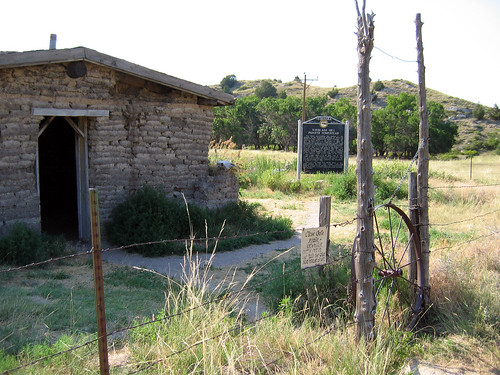
Windlas Hill, sod house, Nebraska.
(*photo credit)
July 14, 2022 Promoting UNESCO Global Cultural Sites
All too often we see places designated as significant cultural or historical sites being damaged or destroyed. We in Kentucky lost a beautiful covered bridge to an arsonist last year. We ought to look beyond and give attention to sites and artifacts of importance in all parts of the world. The quality of our lives is enhanced by flourishing, diverse cultures -- for in diversity comes richness of human expression. Let's focus on the United Nations agency handling these areas of cultural preservation: The United Nations Educational, Scientific and Cultural Organization (UNESCO).
The basic mission of UNESCO is to contribute to sustainable human development in a culture of peace underpinned by tolerance, democracy and human rights, through programmes and projects in UNESCO's fields of competence: education, the natural and social sciences, culture and communication and information.
Declaring cultural sites as global heritage areas with protection for safe travel and accommodations is a welcome activity. These are actually quite numerous. Just as recognition of local sites when left unprotected invites vandalism, so it does at a global level. However, global recognition, along with adequate promotion and protection, may tap into a growing willingness of tourists to assist in fee payments. In poorer areas, tourist fees may be insufficient to maintain such sites and other funding sources will have to be found.
Global heritage sites include the Temple Mount in Jerusalem, St. Peter's in Rome, Saint Sophia in Istanbul, the Taj Mahal in India, and Angkor Wat in Cambodia. The Smithsonian Institution lists ten endangered global cultural treasures including Visoki Decani Monastery in Kosovo and Jaisalmeer Fort in India. The religious and cultural requirements, activities, and fund-raising could continue, and worship times and space would be respected. Praying at or near the site would expand the sense of global social capital -- our common brother- and sisterhood through religious expression. If we are not moved religiously, at least our global cultural environment is in need of expansion.
UNESCO cultural site preservation is in great need of funding today. The number of these defined global sites could be increased to the degree that money would allow for guards, guides, preservationists, and promotion people. Most likely the best way to fund preservation projects is through a total or partial entrance fee at the site itself -- though some religious or other cultural groups may find this out of keeping with their own manner of acting. Perhaps this fee could be extended to a tax on tourist agencies that include the particular sites on their tours. At least an effort should be directed at wealthier national agencies to contribute to preserving our global inheritance.
Saint Kateri Tekakwitha: Saint Kateri, we honor you as foremost among the Christian Native Americans. You loved your own and also the environment in which your people dwelt. Through your intercession may we appreciate all the Native American tribes; help us to value what these gave the people who migrated to these shores. Speak to the Lord on our behalf, to move our minds and hearts to accepting our rich diversity of cultures.
Role of Religion in Russian/Ukrainian Conflict
Religion may be playing a greater role in the conflict between Russia and Ukraine than one might expect. The majority of the Ukrainian people belong to the Orthodox form of Christianity, but even this must be qualified. Some 57% of Western Ukrainians believers and over 63% of Eastern ones are Orthodox,while Greek Catholics with allegiance to the pope account for 30% of the West, Latin Catholics 1.5% of the West and0.3% of East, and Protestants 3.6% of the West and 1.9% of the East. From an overall standpoint, one might say that 80% of Ukrainians are Orthodox and 10% belong to the Greek Catholic Rite, and 10% to other diverse religious groups.
The Orthodox components have been in a state of flux for the last two decades. In 2019, one major portion of them (becoming the new Orthodox Church of Ukraine) was granted autocephalous standing, or independence apart from Russia; this group was given direct allegiance to Bartholomew, Patriarch of Constantinople (first among equals) and resulted in a major split within Orthodox ranks; Russians felt a loss. The recognition did not sit well with Putin who, with the Russian Patriarch Kirill (Patriarch of Moscow and All Russia) in tow, withdrew recognition and technically split the Orthodox community into two parts, with the Russian larger portion of the roughly 300 million Orthodox members not on speaking terms.
Thus, the two major Orthodox components in the Ukraine included the Russian-oriented Ukrainian Orthodox Church, which is now dramatically declining since the February 24th Russian invasion. Many Orthodox are offended by Kirill’s support of Putin and his accusing “enemies” of the state as trying to divide the unity of the Russian and Ukrainian people and demanding “special military operations.” Even amid turmoil, some of the UOC parishes may remain within the Russian orbit for fear of reprisal, if Russia continues dominance of the Eastern portions of the Ukraine. If this chain of events sounds confusing, it is just that; Orthodox believers are casting about for which Patriarch to mention as prime leader in their Divine Liturgy service (similar to Catholic’s mentioning the Pope at each Mass).
The horror is that instead of bringing about a platform for peaceful negotiations, Patriarch Kirill is dividing more deeply an already fractured Orthodox community. The continuation of the conflict will only deepen divisions within the Orthodox family. The deliberate shelling by the Russian military of schools, hospitals and residences, and the rape and murder of innocent citizens demand justice – and this could take years to execute under existing conditions. How will this end, except a change of political AND religious leadership on the part of Russia? To continue the current hostilities will only deepen differences among those who ought to be cultural and religious brothers within the Slavic family.
One added religious note: Since the mutual excommunication of the Great Schism of 1054 has been lifted in recent decades by both Catholic and Orthodox leaders, one wonders whether there is even a division between Catholicity and Orthodoxy. The Jesuit Pope has a good relationship with the Patriarch of Constantinople, who surprisingly received part of his education from the Jesuits. In the strict sense, the two churches are united, but do not admit it. The quicker this unity is recognized, the faster we may come to a peaceful coexistence of Russians and Ukrainians.

The carpenter bee.
(*photo credit)
July 15, 2022 Recognizing Damage to Our Cultural Commons
Our Cultural Commons is a focus this month. We realize that our inherited culture is a valuable part of our history as individual groups and as a global aspect of the human family. We have treated at different times various areas of infringement on this Commons: indifference to protecting treasures; commercial development of cultural sites; and loss of ancestral languages. Lack of valuing a culture leads to an indifference that can even affect people who reside near cultural sites. Intolerance creeps in, hospitality slackens, and discrimination occurs in subtle ways. Military struggles bring on resentment and hatred, and bullying and friction increase, especially against minority groups in a country. Religion involves more than private spiritual practice; it is the public manifestation of one's beliefs, involving acknowledgement of a Supreme Being through acts of reverence, petition, contrition, and gratitude; their places of worship become cultural treasures.
Religious bias and persecution devalue these religious expressions, and unfortunately is present in many parts of the globe, as enumerated by human rights groups. Blasphemy laws exist in Pakistan and Iran against non-Muslims, resulting in imprisonment and even death. Persecution against various religious groups occurs in China and North Korea. Conversion away from a predominant religion can even bring death in certain Middle East countries. America prides itself in separation of church and state; while early colonies restricted religious groups as set by established churches or first settlers, this was regarded as oppressive by the country's founders. However, American constitutional guarantees of freedom of worship did not erase the barriers to Catholics and Jews for decades.Nor does it restrict the growing indifference to all religious practice occurring today.
Human rights violations among migrants and refugees are of special concern. Cultural restrictions have economic ramifications, for discrimination often targets minorities with lower income and their places of worship. Often, governments are reluctant to take steps to defend the oppressed because majority groups dictate policy and governments like to hide their home-grown religious discrimination. Within the last decade many of the historic and cultural sites in Syria, Iraq and other parts of the Middle East have been damaged or destroyed. Often the ancient minority groups have been uprooted and forced to flee to other nations. Certainly, national governments must be pressured to respond to what is occurring within their borders. In some cases, international agencies must be called on for protection. All of us need to be concerned about the rights of oppressed peoples; we need to see that persecution of people and damage to historic sites are often closely related problems.
Saint Bonaventure: You were an easy-going philosopher with many creative thoughts and a substantial following of those who appreciated your way of thinking. At all times you were close to the Lord in simple Franciscan ways. We ask your intercession to allow us to be creative, but not self-centered and stuffy. You teach us that all talent is God-given, and that our use of it is not on our own merits; we are subject to divine promptings. May the Spirit make us a little like you.

Chickory, Cichorium intybus.
(*photo credit)
July 16, 2022 Listing Green Tourist Guidelines
July is high tourist season in the United States; it is the only free month from schooling for many in this country. The environmentally concerned citizens want to do the right thing and are motivated, especially when they notice others messing up pristine environment through careless habits. We can lessen any detrimental tourist impact through simple guidelines that are found in our book: Ecotourism in Appalachia (University Press of Kentucky). These guidelines are also listed as ways to reclaim our cultural commons in Reclaiming the Commons:
Green Tourist Guidelines
By the twenty-first century, tourism, the world's fastest growing service industry during prosperous periods, has approached an annual one trillion-dollar business on the global scale. Although tourism thrives where sites, transportation, and lodging are maintained, still the welcoming attitude of people is of immense importance. In order to respect native cultures, green tourist guidelines include:
* Be aware that the carrying capacity of certain regions is exceeded by excessive tourism that puts stress on land, roads, waste facilities, and the flora and fauna;
* Pack out and dispose properly of what you pack in and consider amounts when planning trips;
* Encourage infrequent long-distance trips (local travel -- frequently, regional/national -- infrequently, global -- rarely, and space only for scientific purposes) and substitute virtual travel using Internet videos or printed travelogues, especially for wilderness tours. This curbs fossil fuel expenditures;
* Emphasize travel closer to home, using bikes or walking tours where possible ("stay-cations");
* Curb all-terrain vehicle use in fragile areas, and declare such areas off-limits to all for recuperative periods of time;
* Initiate a three-part cultural preservation program that focuses on tourist satisfaction, preservation of the culture and environment, and just compensation for local workers;
* Promote the region's natural flora and fauna as well as cultural and geological highlights through signs, brochures, and advertising; and
* Train tour guides in cultural highlights and local ecology so they can instruct tourists on such issues.
Prayer with Attention: O God, our minds wander far and wide, with little in the way of controls. Our service, whether when young or old, is never perfect, and yet we strive to be better. Fill in the ruts of our lives with your grace, allowing us to make rough ways smooth. May we find an outward reverence that focuses us and augments an inward attention and openness to your grace. Train us to kneel, or sit, or stand, and to pray in the most conductive mood possible. Assist us to discover our needs and recognize when prayers are answered. May we gently lead others to periods of prayer with full respect and attention during this age of over-informality. Keep us focused!

Blue-eyed grass.
(*photo credit)
July 17, 2022Choosing the Better Part: Mary and Martha
Martha, Martha, he said, you worry and fret about so many things, and yet few are needed, indeed only one. It is Mary who has chosen the better part; it is not to be taken from her. (Luke 10:41-2)
From a secular view the concerns of Martha seem highly justified, for to prepare a meal for the Lord in a world devoid of microwaves and refrigeration must have been a real challenge. Most likely the fireplace for the baking had to be tended carefully, meat cooked and prepared in special ways, bread baked, olives, figs and dates selected, and special wine obtained. In other words, it took work and required many tasks to make a perfect meal for so honored a guest. One can sympathize with Martha's request to have a little support from her sister for helping in the preparation.
Jesus does not agree with Martha, however. Mary is not to be deprived of listening to the Word of God (Christ himself). She is a true follower and willing to listen attentively, and this spiritual plane of service is the higher level. To hear and reflect on God's word is a better part of human life, though not the only one. Jesus does not tell Martha to relinquish her serving role and do what Mary does, only to allow her to include attention specifically to the guest as a higher calling, even with other needed essential service expected as part of total hospitality. A simultaneous set of good services is the more balanced approach; there may be priorities.
I continue to struggle with an interpretation of this passage, and in fact, being an activist and one who considers the priority of action, find this to be a deference to reflection and its priority. Let's resolve this in that Mary takes the choice part in communication with the Lord, but Martha has an important role provided she does not break the continuity of a unity in communication through her fretting and negative attitude. Prayer and work go together and some souls must at a given time do one and at another time do another; another person is called differently.
A delicate balance is always difficult to maintain. In a perfect world, Martha ought to have not fretted but done her dutiful service with the fullness of generosity that Mary was doing an equally important (and even a greater) task in listening to Jesus at that given moment. Martha was called at a different time to listen to God's word, but in allowing her sister the opportunity to listen more intensely, Martha ought to have rejoiced that both were doing what they were called to do -- even if her own service was of a more humble degree. Jesus does not say, stop your actions and come sit with Mary. He washed the Apostles' feet. Those reflecting on Christ's calling must do so, and those who assist those who reflect must also do so. Both are needed.
Grace of Hospitality: Lord Jesus, you were invited to your friends Martha and Mary's place and treated with great kindness. It must have been an effort by Martha to prepare the proper meal, while Mary sat and conversed with you; you defended Mary's role when Martha sought to have her assist with the multitude of details for a meal. While you said she had taken the greater role, you did not deny the minor ones either. May we each find our own place and accept a humble station in contrast with those with greater positions in life. Let us all work together happily in what the Lord prompts us to do.

Visiting the Daniel Boone National Forest.
(*photo credit)
July 18, 2022 Seeing Wood Biomass as Benefit or Disaster
Biomass is wood and other combustible materials used for fuel in space and water heating and the production of electricity. While biomass combustion emits carbon dioxide and some toxic emissions, it is commonly regarded as a renewable energy source because in due time it will be replaced by other wood-bearing trees. A sizeable portion of energy consumption in some African nations is from wood (Ethiopia 92.9%. DR Congo 92.2%. Tanzania 85.0%): interestingly, the tropical forests of these lands are good and vital carbon sinks that are being threatened. Even in the U.S., 1.4% of our electricity was generated by burning wood in 2020. The waste materials resulting from the lumber and paper pulp industries can be and are used in generating electricity. In theory, equivalent amounts of carbon dioxide emitted in combustion will be captured in forest growth.
Certainly, wood biomass has other advantages: its combustion product is less toxic than coal and can be seen as a replacement in the ever-changing fuel mix of our country. Wood biomass is reasonably priced and otherwise a worrisome waste material; it can be used when mixed with coal in smaller amounts without any changes in the power plant; and it is a non-intermittent fuel in contrast to solar and wind energy sources. However, the wood-sourced fuel is not perfectly "green," whereas burning waste biomass uses materials that could be buried or composted. Much of wood burning occurs in smoke-filled native hovels, where inefficient cooking stoves are said to waste at times as much as 90% of the fuel used.
The contention that wood biomass is carbon neutral and can be classified as a renewable energy source is an over-simplification. Much depends on forest type, growth rate, and other conditions. Lands used for wood harvest could grow other crops but sequester less carbon dioxide; burning wood increased the carbon dioxide today when curbing is so utterly necessary, whereas growing trees to absorb the equivalent carbon could take a century if growth rates hold up. Further, procurement of wood as resource often requires petroleum-fueled equipment in cutting, loading, and transporting the wood. However, much wood biomass is in the form of pellets that take processing energy to turn wood into a slurry from which pellets will ultimately be extruded and dried.
Considering wood biomass for renewable fuels to meet set renewable energy goals in highly industrialized lands can mean partial destruction of forests and only questionable climate change reduction. Wood sources are being sought for Europe's hungry power plants from other continents -- and that entails damage to the forests which are the lungs of the world. Demands are huge; supplies in burdened forests are limited. Yes, a growing forest is a net sink of carbon dioxide. Biomass wood extraction must be done with moderation. Conserve our fragile forests!
Lightning& Thunder Prayer: O Creator God, you give us all good things, some of which we must treat with deep respect, because they could be harmful if at the wrong time and place. Such are the electric volts of lightning, which show your power as mentioned by the psalmists when the thunder rolls in. All of us are moved to say a prayer for protection and trust in you. May we hear the thunder and take cover; may we be respectful and enlightened in a flash; may we be thankful to live for another day.
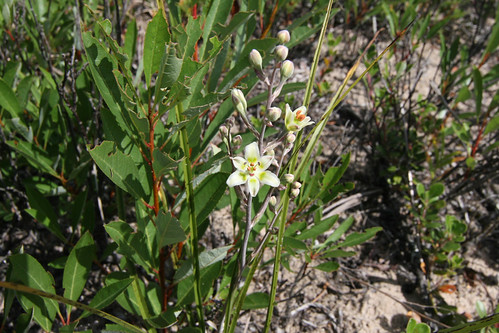
Zigadenus glaucus, Dune lily.
(*photo credit)
July 19, 2022 Tolerating Less Indoor and Outdoor Air Pollution
Reflect on it! Air, the free gift of our Creator to all on this planet, is polluted and this does harm to human beings, animals and plants in untold amounts -- even after years of recognizing the seriousness of the problem. This air is a Commons which belongs to all of us and is not to be damaged by privileged individuals and groups who pollute as though it is their right. If damage were minor, this would not be a problem, but we are fully aware that widespread pollution can occur through industrial processes and that human health is threatened by air pollution.
Air pollution kills more people than AIDS and Malaria; the U.N. World Health Organization study estimates that 3.5 million die annually throughout the world from indoor air pollution (generally women, children and home-bound in poorer countries). Likewise, another 3.3 million die annually from outdoor air pollution. These numbers have not really changed much in the past four decades, but why, with all the environmental awareness of the most elementary form of global contamination? On top of this, excessive emissions of carbon dioxide and methane (partly through human generation) are contributing to the climate change that is affecting our planet, and we only have a narrowing window of time to curb such practices.
We seem to lack the will to fight outdoor pollution. The devastation is not the only problem. The ease of addressing the issue is not a mystery, but it requires our will to act as a people. The U.N. Industrial Development Organization says that cleaner energy could lead to a cleaner 2030 and a carbon-free 2050. Much of this can be achieved by expanded use of solar, wind and other renewable energy sources both in transportation and in the generation of electricity. Further additions can be achieved by more energy-efficient industrial and space heating and cooling practices. These are proven to be both resource-saving and good financial investments, but it takes a willingness on our part.
What about barriers to curb indoor air pollution problems? As mentioned yesterday, many cooking stoves in native hovels are inefficient up to 90% and contribute to toxic emissions and waste of precious wood. We can say that solar cookers would be an answer for the poor woman cook, but she does much of this work before sunrise or after sunset; many but not all meals include dishes requiring an intense source of heat that solar cannot normally give; and getting people to solar stoves takes enormous effort. However, energy efficient wood stoves and solar cookers could reduce immensely the total victims to this indoor scourge. It is well worth Peace Corps and alternative service-type efforts by a host of industrialized nations. The methods of improvement are low cost; and the pay-back is so easily recognized by the victims of indoor air pollution. This could be the world's premier win/win situation if more effort is expended in developing countries.
Ice Cream Prayer: Lord Jesus, who gives us refreshment, allow us to be physically refreshed as well as spiritually so. You enjoyed meals and conversation with others and savor the special treats like the rest of us. While fasting has its place, so does the treat of a good cool sweet substance on a hot day. May we enjoy desserts with zest and be so moved to continue being of service in the work we do. Lord, show us how to appreciate the good things of life for the ultimate benefit of all.

Red admiral, Vanessa atalanta.
(*photo credit)
July 20, 2022 Defining Culture Differently
People define culture in different ways based on ethnicity, political, or economic perspectives. Disparity of wealth at all levels erodes the cultural capital of a community whether local or global -- and by allowing this situation we become party to this offense. In some cases, those who are acquainted with this emerging global wealthy elite conclude that America needs its plutocrats. Modern culture must look beyond wealth and find spiritual motivation because the economic inequality must be countered in order to successfully renew our Earth.
* Individual:
Greed is a virtue and Charity is the concern and decision of the privileged, versus
Sharing is a virtue but charity can be an exercise of power, and so doing justice is better than merely giving to the needy in charity.
* Regional:
* Consumers will be motivated materially to strive for greater shares of the resource pie; and
* Economicand corporateprivilege knows best, no matter what the world mess, because the poor know so little,versus
The material pie is limited; motivation should be directed to higher spiritual and qualitative horizons.
Beware of the materially privileged and realize that "the poor" hold the key to rising and saving the Earth.
* National:
Democracy means complete free choice, and millionaires have a right to become billionaires, versus
Democracy is harmed by excessive private wealth andSuperrich inequalities hurt the human society.
* International:
Free market and free trade are articles of faith;
Credit energizes a culture of consumption, which influences people and nations far and wide, versus
The market must be regulated and trade must be fair along with consumer rights protected;
Capital and credit are dangerous when unregulated.
* Global:
Government is despised, complacent, disparaged, and manipulated as a source of bailouts, and
Problems are solved by private secular procedures, versus
Good government is absolutely necessary for the sake of our wounded Earth and our global economy, and troubles stem from a lack of reverence and faith in the future.
Prayer for Natural Family Planning: Lord, give us an understanding of natural family planning, and help us spread the word to those in need. Contraceptive methods stretch beyond simplicity; they can harm bodily health when misused; they can frustrate the natural ways of acting. Lest we forget, natural planning is the ordinary manner without artificial chemicals; and encourages the cooperative efforts of both spouses. May the process be in keeping with both religiously moral and ecological ways of living.

Bracken fern, Pteridium, along a forest trail.
(*photo credit)
July 21, 2022 Examining What This Means: God Is Love
St. John's Letter says that "God is Love" and we wonder what this really means. Upon reflecting, we discover that our English word love loosely embraces several words in Greek (Storge or affection; Eros or sexual love, Agape or the Christian concept of unconditional love as in "love feasts" and liturgical celebrations, and Philia or dispassionate virtuous love or friendship within a family). Jesus asks Peter in the post-Resurrection event in Chapter 21 of St. John's Gospel if he loves him; Jesus uses Agape two times and Philia in the third question. Thus, there are ever deeper degrees of love expected of Christ's followers -- and Jesus asks deeper love from Peter who denied him thrice on Good Friday.
Love is reciprocal. As God loves us so ought we to love in return. But how can we return love, which is infinite, except that God gives us a beginning. Our love must also be unconditional love and truly it ought to ever deepen. As we come to recognize God's love, we discover how little we can do in return without divine inspiration. Love is between those who are present to each other. In this sense of relationship to others we realize that God as Creator is the source of love and source of more perfect love. God is good; God is holy; God is all powerful. In each of these utterances we declare again and again that good things come from God and not from ourselves, and goodness has divine origin.
Atheism confronts us. Some in this world of growing atheism state that they have loving relations with others and thus are the origin of love among themselves and others. The logic of ex-believers is that if "God is love" and they find no personal God in the universe, then in their loving relationships and company they are "gods. The very expression of this belief causes deists discomfort, for our nation was founded on a firm belief in a Holy Other, a Higher Power beyond us, a personal God to whom we must someday give an account, a Being to whom we pledge our Motto "In God we trust." Such a God is alien to the modern atheist who regards his or her ability to love to be proof enough of no need for the God professed by People of the Book.
For believers, we trust in God's goodness and mercy. We seek an abiding friendship between persons, not between persons and things. We love God with our whole heart, soul, mind and strength. But how can we love when we are so limited? Only when we see that we are diving into an ocean of Infinite Love in which we can only survive through the loving God who buoys us up. We are at God's mercy to love with our whole being; we are incapable of loving without God giving us that ability. All we can really do is to freely be open to God. Our neighbors, loving atheists, see no incapability, for they are more than atheists; they make themselves and their related neighbors into gods. To them we candidly admit differences lest we give obeisance to their false constructed gods.
Prayer to the Creator of Air and Water: O God, the Creator of all earthly environment, thank you for directing us to preserve clean air and water, truly sacred heritages. May all on this Earth find and be able to use sufficient potable water and clean air. Fill us with courage to confront those who waste the water and dirty the air. Inspire us to proclaim all creation as good and worthy of being shared by all. Too often we toss away without thinking and we dump our wastes in precious water sources. Make us more desirous to keep our world a tidy place and use your gifts with a deep sense of respect for the Common Good.
Hope for Renewables Amid the Conflict
As the Russian/Ukrainian struggle continues month after month, we review our basic position that climate change demands a peaceful atmosphere. Perhaps, just perhaps, we must change and say the curbing must occur even if the conflict continues. Sanctions that are including EU cutting oil and gas purchases may be worth reconsidering. The EU and US and other allies must look more closely at expanding solar, wind and other renewable energy sources to replace sanctioned Russian fossil fuels. However, a rosy picture could be challenged by increased energy demands by India and also developing countries who will utilize sanctioned Russian fossil fuel.
In fact, most EU members are making giant strides in renewable energy production and are one-third greater at this time from what was originally slated for 2022. For instance, Netherlands, Austria, Portugal and Denmark are on schedule to using only renewable energy by 2030 and to being carbon neutral by 2050. During this year 2022, the EU total energy consumption is 22% renewable and growing, with an estimated 62% renewable by 2030 and exceeding an original 55% goal if current rates of growth continue. These countries are expanding energy efficiency and accelerating the speed of replacement of coal, oil and gas. Hopefully, these efforts add to the health of the population and create many new jobs as well. Even with a possible economic down turn, renewable energy investments will grow and fossil fuel phase-out accelerate. Overall, with proven technologies and available solutions it is likely that the entire EU community can reach a new goal of a 100% renewable energy system by 2040.
North America, though not deeply affected by the sanctions on Russia, can still reach renewable energy goals with strengthening resolve. In fact, virtually all of America’s energy sources in the first half of 2022 are renewable; over one-fifth of current energy uses are from renewable sources and the total is expected to rise at a rate of almost one percent a year during the rest of this decade. Strong renewable energy gains (especially all forms of solar applications as well as both land and off-shore wind generation) are beginning to make a global difference.
While EU and American renewables will hopefully stay on schedule to substitute for fossil fuel, the same cannot be said with much certitude for developing nations and their energy appetite and their willingness to use cheap fossil fuels where possible. Economic uncertainty may reduce energy demand, but easily accessible Russian gas and oil may reduce the drive by poorer countries to renewables. This uncertainty also extends to a major energy user, India. Much depends also on what road China will take to increase electric auto manufacture and for energy efficiency and substitution measures.
Russia is always the wild card in renewable energy substitution and the curbing of climate change. Collaboration at the time of severe sanctions can hardly be expected. One can hope that the gas and oil exports will be reduced through existing sanctions and that less opportunity is available to have their exports go to non-cooperating energy consumers. Part of this depends on the ability of the allies of the Ukraine to make the sanctions stick, while advocating for renewable energy on the part of all. Will it work and the climate be controlled? Let’s pray that sanctions work and renewables grow accordingly.
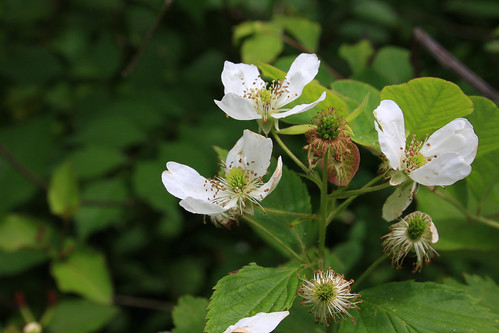
Summer treat: fresh berries.
(*photo credit)
July 22, 2022 Eating Food With Others Has Sacred Significance
In July, we have many picnics and gatherings and need to ask ourselves about the importance of food gatherings. Meals fit into the Gospels in many places and Jesus is central.
Recall the Marriage Feast of Cana, or the meal marking a significant time in life with an embarrassing moment of lack of a basic ingredient; that was Jesus' first miracle. We read of the Multiplication of the Loaves in each of the Gospels, the physical needs of people for food in a deserted place being a key to the miracle of sharing food with others. The Last Supper is of special importance, for it is the reenactment of the Jewish Seder, the constituting of a New Covenant bonding, the instituting of the Eucharist, and contains a discourse on love (St. John's Gospel).
Eating food fits into the post resurrection narratives of St. John, including Jesus himself as servant preparing the meal that the hungry disciples can recline and eat with him. In another post-resurrection narrative, the Emmaus Episode in Luke's Gospel is a food-centered situation of hospitality wherein Jesus' Presence is realized in Bread Breaking -- a name given to the early Christian liturgy or Mass. Instances of others having Jesus as a guest, such as the Mary and Martha incident in Luke's Gospel, involve others preparing a meal for Jesus. In John's Chapter 21, Jesus actually prepares the food (bread and fish) for breakfast, and then invites the disciples to bring some of their miraculous fish catch and include it in the meal -- a grand potluck. We are all invited to a sacred meal, the Eucharist, and to participate in preparing and consuming it.
Etiquette is an important aspect of eating as we all know. Jesus speaks of the King preparing a large feast, and the invited guests excusing themselves; then the king calls in strangers -- but he demands the proper garment. It is not the custom of the garment wearing that is important here, but the attitude of the guests to fully participate. We need to come to the meal ready to follow the proper deportment. This proper manner also is expressed in stories about failure to give the ritual washing and yet the sinner came to the dining area and bathed Jesus' feet with her hair.
Partaking of food together makes us one, whether a secular meal or the Sacred Liturgy. For much of the Middle Ages only the celebrating priest consumed the communion in normal Liturgies, but with the reforms in the Church after Vatican II we have far wider participation by the people in this event. We are a people who come together and become one people when we eat food together. We come to know and feel the needs of others and assist them in our presence, and they help us by being present to us; a community is formed together through a sacred meal.
Grace for Prudence in Summertime: Lord, in the heat of summer and amid the activities of this season, we need to be most prudent with the use of our time and energy; this is not the season to over-exert. May we realize the dangers of being overly heated and stay out of the hot sun in mid-day, knowing that much can be done in the cooler times of morning and evening. May you inspire us to encourage prudence to all who are near and dear, for these too must learn to pace themselves in July.
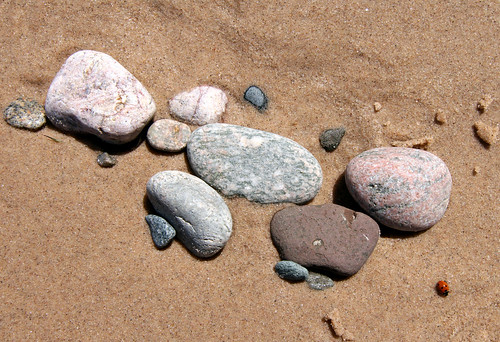
Ladybird beetle exploring "boulders" (pebbles) along sandy shores.
(*photo credit)
July 23, 2022 Addressing Anti-Boredom Month
For many who are out of school or on vacation, this is a challenging time to stop the devil from setting up a workshop. Here are some suggestions for overcoming boredom:
* Accept some light reading material that is a change of pace and yet quite engaging;
* Perform a different physical exercise today, but don't overdo it, for the muscles need adjusting;
* Light a vigil light for a sick friend and leave word of what you have done for him or her;
* Vary your hour of sleeping and rising so that the biological clock is challenged for part of the summer;
* Strike up a conversation with a neighbor whom you have ignored over time. Most likely you have much in common;
* Discover a new hiking route and make it a little longer, though change the gait to a slower one in hot July. Consider stopping and listening to the sounds of July or carry a bag and pick up a little litter along the way;
* Go to a movie, festival or music concert when these are not your routine forms of entertainment;
* Check your phone listings for someone you have not contacted in a half-year and make a surprise call out of the blue. I once did this to a relative and found it was the day before their 50th wedding anniversary -- and I did not have a clue;
* Take time this evening to watch the sunset, perhaps with another person. You may prefer to paint, draw, photograph, or write what comes to mind;
* Spend the evening with the stars. The Perseid Meteor Showers are occurring and outdoor night-gazing for these will continue for another month;
* Watch butterflies or hummingbirds and study how they conduct their everyday feeding habits. Perhaps this is the time to prepare a feeding place for them;
* Visit an overlooked website and see what it has to offer. One possibility is to look at the NOAA photos of the Earth;
* Hot weather allows a new flavor of ice cream and the month with ice cream emphasis is worthy of a change of pace;
* Go out and seek and pick some berries, for this is the height of berry season, and you deserve the taste of July one more time. Perhaps pluck some more to share with others;
* Clean out the pile of papers that is hardly ever looked at, for there will undoubtedly be some pleasant surprises in looking these over;
* Visit a farmers' market or a yard sale and spend some extra time in conversation; and
* Give some extra time to prayer or undertake a devotion that you do not normally do, whether in home, church, or in the great outdoors.
Mountaintop Prayer: Lord, we look beyond to the mountains that beckon us to attain their summits, as we have done in times past. We know your love and presence in your favorite higher reaches. Let us at least climb in a virtual way and look out over the beauty of all creation. There's something magical about those special mountaintops of our lives. We have a special viewpoint.

Black rat snake, Elaphe obsoleta, in clover patch. Washington Co., KY.
(*photo credit)
July 24, 2022 Having a Prayerful Persistence
Give us each day our daily bread. (Luke 11:3)
What makes a good writer? One answer is persistence, or to put it crudely, "ass power," that allows one to sit long enough to write on a theme amid all adversities. What is said of a good writer must also apply to a good petitioner -- and that is what we may be before our God. The elements of the "Our Father" that Jesus teaches his disciples in today's reading is one of praise, a quest for forgiveness, and asking for what we do not yet have. In some way we know the things still lacking, and seek the goodness of our heavenly Father to bestow these in some fashion to us.
Begging over and over. Amazingly, even those who pray very little know when safety is in doubt or a threatening condition faces them or a loved one; this is a time to turn to prayer, to beg God for what seems so needed at this moment. That is the "fair weather" praying person, though conditions may be changing dramatically for him or her and beyond control at that. Recall that the disciples asked Jesus to teach them to pray and he gave them the short "Our Father." It is not number of words, for some of Scripture's most telling prayers were simple declarative statements of need. Jesus teaches us more in this passage: be persistent and continue knocking again and again. Believe in the power of prayer -- and deeply believe.
Asking from a persistent heart. It is important at times to spend in prayer; some feature repetitive prayer such as the rosary, but here the mind meditates on the sacred mysteries and not on repeated words as such. In such a prayerful state for those of simple tastes (virtually all of us), over time the heart will become more tender and the prayer will be all we have to offer in simple and often wordless periods. As the heart becomes more inclined to God's love and mercy, the voice may become silent and words fail, leaving us before our God with an open heart. It is persistence in attitude that establishes an atmosphere in which we are asked to approach God.
Balancing petitions with gratitude. Our prayer ought to be in an atmosphere of utter gratitude for what God has done for us. Interject those ongoing petitions with thanks to God for good things given. Yes, we are beggars in every sense, but we need to always be thankful beggars and to teach others to do the same as well. When someone comes to us for food, at least ask them to say a prayer for us. Few ask another for their prayers, and yet the poor and hungry asking for daily bread are heard before God. If we enter their prayer, we are more inclined to share our bounty with them and to do so with a gracious heart. Yes, prayer is heard and we can grow in spirit before God and all.
The Our Father: Lord Jesus, you give us a simple prayer said by believers so many times. The "Our Father" allows us to approach God in a very familiar way as "Abba." It contains the praise, petitions, and request for forgiveness and deliverance in plain-spoken statements with little fanfare. Integrity unfolds and we are urged to speak with full meaning and participation of mind and heart. Help us, Lord, if we lack forgiveness of others to overcome such a condition; give us the openness needed to grow through a meaningful reciting of this greatest of prayers.

A summer bouquet.
(*photo credit)
July 25, 2022 Promoting Tourism/Retiree Communities
Appalachia has been a target region for extracting coal, timber, natural gas, and oil. The assumption is that higher paying jobs exist in the extractive industries than in service ones such as tourism and restaurants. Without these extractive jobs the region would lapse into subsistence living and the most modest of living standards. However, every tree has some sightseeing value and a setting for retirement communities. Likewise, one recalls that renewable energy has a high job growth potential with good paying jobs in all parts of America including Appalachia.
Tourism has immense potential as can be found in forested parts of our land. We stressed the ecological variant in our book Ecotourism in Appalachia. First, this region is within one day's drive of half the American population; it has immense natural beauty where not marred by extraction; a wide variety of services can be and are offered by existing facilities; an improved road system allows access to all parts of the region; and the people are hospitable and willing to serve. Money brought in by tourists supports lodging, restaurant, souvenir, entertainment, recreational guide and management services. A tourist business can be satisfying to workers for it demands their social skills and the interaction with visitors. Furthermore, local artistic expression (music, dance, wood and textile crafts) can be enhanced by tourism.
A retiree community is a real sleeper as far as development goes. The fact is that many who grew up in the region and would like to return know that cost of living is far less than in many urban areas, that native people and culture are welcoming, and that neighborly relations and a milder climate are major pluses. Such communities support local arts and crafts, do not require expanded educational facilities for youth, and invite helping hands willing to enter into the social capital of the guest community. Health needs increase with more retirees, but this is economically beneficial to the total region that has a solid base on which to expand health services. Since retirees now tend to live longer, a meaningful life of additional decades adds to economic wellbeing. Care for aging elders offers extra jobs for local residents.
An economic mindset needs changing. Tourists and returning retirees have proven a godsend to areas of southern Appalachia (North Carolina) and the Ozarks (northern Arkansas and southern Missouri). These economic models could be expanded to other areas as the baby boom generation matures and reaches retirement age. State development offices need to change from the extractive and manufacturing focus that has only limited possibilities as well as real environmental damage created. "Come and Enjoy" and "Come and Stay" have greater potential than trying new forms of industry.
Tourist and retirement viability demands an infrastructure that has ample opportunities for local jobs and a sustainable economy.
Saint James, Apostle: You and your brother John were favorites of Jesus, and you yourself were the first of the apostles to die. Being first means what Jesus says, to bear the cross with him and give service to others. Today, your shrine in Spain is a pilgrim favorite; please intercede for all of us on our journey of faith. May we find you a perfect model.

Fowlers toad, Bufo fowleri.
(*photo credit)
July 26, 2022 Considering American Ethnic Changes
Why is American ethnic data of importance? An ecological answer is because ethnic neighborhoods are threatened and are endangered species, just as are some plants and animals. Preserving and highlighting ethnicity is a broader environmental concern that is often overlooked. Quite often, environmentalists limit themselves to the physical environment; however, the physical and cultural environments go hand-in-hand and deserve mutual respect and protection; Earthhealing involves both.
Mark Spencer, Janet Kalisz and I have just completed a five- decade expansion of the Ethnic Atlas of the United States. This book is now available through Amazon Books (click here to access Digital eBook at Amazon.com ). It includes data from the 1980, 1990, 2000, 2010 and 2020 census compiled through the efforts of the same three people. We doubt whether any other individual or group can make this statement of a long-term project. Comparing these maps shows major changes in some states (e.g., Texas), when one takes the time to make interesting comparisons.
A melting pot? One may ask whether comparing these five decades in state-by-state differences describe that America is a melting pot. In some cases it appears that way, with European sub-groups intermarrying. However, the rise of Hispanic and Asian American numbers has changed the complexion of certain but not all states; furthermore, Native American numbers continue to rise. In the long run, what changes is immigration of specific groups rather than population increase from residential birth (rates are declining).
Simple pluralities are what we seek in describing a multiplicity of ethnicities in given counties and cities. However, the more diversity that is expressed, as in the year 2000 maps, the more complex is the picture. Only in viewing larger aggregates do we begin to get a general ever-changing ethnic picture. We are comparing over three thousand counties and tribe clusters five different times. We are more precise than other ethnic compilers; when two groups within a county are within 5% of each other in plurality we divide and illustrate both in the particular county.
Mobility is one explicit characteristic of the entire country and this affects ethnic concentrations over time. Internal movement of people to senior retirement areas (Florida and Arizona) or to natural non-urban arenas (Rocky Mountains) by those working at home or desiring milder climates shows itself in certain state changes. The nation is constantly on the move; we observe suburban flight, abandoned neighborhoods, Hispanic and Asiatic in-migration, climate preferences, retirement areas and gentrification tendencies to name a few. This five-decade comparison is an exercise in cultural environmentalism. Please obtain a copy and enjoy it.
Elders and Grandparents Prayer: Lord Jesus, we are getting older and are beginning to feel it in small ailments and reduced mobility, in forgetfulness and extra pains, in slower steps and longer rest periods. That's life, and we are doubly thankful for love ones and kindly neighbors, for extended life and pauses to pray, and for all the countless divine gifts. We recall this on the feast of Joachim and Anne, your own grandparents. May we respect elders and learn to be good ones!

Emergence of fungi after summer rains.
(*photo credit)
July 27, 2022 Cultivating Our Sense of Gratitude
In the middle of seemingly endless July with vacation time upon us, we have no major event, but only freedom, to give an unsolicited "thank you" to our Creator for life and blessings. Gratitude is the ongoing "climate control" of our personal spiritual environment. While writing this, my workhorse computer that is composed of recycled parts and is about eighteen years old has a screen that shimmies and shakes, telling me that its life may soon end. I thank God for the years of use I've had for this non-Internet-connected composing device that holds over two million edited words (backed up several times to be sure in discs and thumb drives). But all the same we have so very much to be thankful for from health to safety, to good days, to life itself.
Thanks in the beginning. In a movie The Milagro Beanfield War, the actor awakens each morning and thanks God that he is still alive. What a grand beginning of the day! Cultivate the sense of gratitude by thanking people for the least service rendered to us whether holding a door or giving a compliment. "Thank you" should be among the first words for infants learning a mother tongue and by those struggling with other languages (gracias!, merci beaucoup!, danke!). We owe so much for mutual services to live and move and eat that we ought to express it in many ways to those we encounter. Thanks should be on our lips, and I give my own parents credit for teaching this -- though at times I forget.
Thanks throughout the day. The days of July has certainly some of the longest daylight and worthy of special thanks. It is becoming for us on frequent occasions to say "thank you, Lord" with an emphasis on what we owe for the many things beyond our enumeration. Let's recall health, refreshment, nourishment, comfort, and even aches and pains or the current absence of some of these. For those of us with active sense of sight a flower or bird or tree ought to at least sometime elicit thanks. The neighboring mockingbird in spring time alerts me to the change of season that is more muted in summer, but with able additional companion/gifts. Let us begin to see each creature that comes into our lives as a present from the Creator for us to extend gratitude.
Thanks at the end. Soon enough, days end and so do the previous conditions of pleasantness, and even the change and chance for endurance is worthy of our thanks. For those whose mortal life is now passing, be so kind to remind them of great people, moments, and places to be thankful for. I hope and pray that in my final hour before approaching a merciful God I can express gratitude. When coming into the presence of a dying person along with
traditional prayers I recite the ordinary things to be thankful for, and ask all loved ones to respond with "Thank you Lord." Gratitude is such a wonderful gift to present to a merciful Lord.
Flowing Waters Prayer: O Creator God, you give us flowing water during mid-year. You awaken us to fresh gurgling streams in the heat of summer. The sounds stir us, as only moving water can. You remind us that we are to find you and deepen our openness to your call. May we respond in gratitude and where possible come near and enjoy the voice of running water, which reminds us that Jesus is living water. May the flowing of your grace be received within our hearts, which always need refreshment.

Brilliant rainbow in midst of forest.
(*photo credit)
July 28, 2022 Tearing Down the Idols All Around Us
Idols can be a multitude of things. However, the images and sacred trees of past ages seem so far removed from our consciousness, that we regard idolatry as passe', but is it? We are always aware that some others (than perhaps ourselves?) will make their automobiles, boats, houses, electronic devices, and other "material things" into what Christians in the past called "dumb idols," that had no power to do anything. However, the growth in sophistication and informational access does not change that alluring insatiable materialism in some form; such a quest only leads to a continued frustrated grasp for more materials.
Idols can be people. Making people into idols may have been around for ages as well when the leader or master or emperor was the idolized god to the follower, who gained status by being close to the proposed god. Think of the North Korean 100% acceptance of a youngster with little experience at anything other than being son and grandson of another material idolized personage. To idolize another appears to be here to stay in some form -- though all of these are highly unbalanced and anti-democratic. What about idolizing a president or ex-president? In the mid-twentieth century, I remember young adolescents (mainly girls) swooning over a pop singer (Elvis P.) or movie star (Frankie S.) and others (mainly boys) idolizing sports figures (Mickie M.). Those who know the current scene assure me the phenomenon continues today with a variety of people whose popularity rises and falls with the tides -- and become familiar Facebook and other social media images.
Idols can be us. This third modern trend finds a variety of expressions: the truly popularized person who is well known as recognized through TV appearances or forms of notoriety may regard him or herself as truly an "American idol." However, even those of instant fame realize how short the span is until another surfaces to replace them. A second set of possible personal idols are those of us with some message worth conveying to others. That includes successful writers, political leaders, wealthy reformers, prophetic types, religious leaders, and just about anyone who through self-promotion can be seen or felt in an ever-changing world.
Idols can be a group of us. This last series is somewhat more difficult to treat because it may not be as evident as the first three groups. It is those who regard "god" as among a group of the elite of which the proponent is privileged to be associated. This person knows full well that an over stress on him or herself will be of short duration, but associations and elite groups can endure with strength in unity. This is as dangerous a type as any and has the same difficulty of all the three previous classes -- the failure to see God as the Holy Other who must be adored and placed apart from human constructed idols. An addicted society is in need of God alone -- not their idols.
Prayer for Spiritual Vision: Great Ruler of the Universe, grant us to see the Spirit working in our people, our Church, our personal lives, our land, and our world. Give us the courage to speak wisely on urgent social justice issues. Teach us to be humble at times of adversity, gentle in relations to opponents, sensitive to the needs of those lacking essentials, and willing to admit our humble stance before you. May we extend that spiritual atmosphere to others with whom we serve.
TACKLE INFLATIONARY FOOD PRICES IN VARIOUS WAYS
We are all quite aware that units of food we purchased a few months ago have now increased one-quarter or more in price, and this is placing a dent in many moderate food budgets. Bringing down inflation is beyond us as individual consumers, but we can do some practices which can make the exploding price tags a little less painful.
Buy bulk foods. Family-sized containers and large sacks of potatoes or rice can make a big difference, when we compare our normal purchase size with these bulk items; the saving could equal the price rises of the smaller items. Consider dried peas and beans in place of canned varieties. Be on the lookout, especially in the growing season, for surpluses that can be stored for future consumption.
Grow salad greens. We are aware of rising iceberg lettuce costs and that of other leafy items. Transform any green space into salad veggies and grow year-round with protective coverings in winter. Pots of spinach or kale can be proof of a green thumb. Most people can have some yard, window or roof space for growing a portion, if not all, of their common salad ingredients.
Buy less meat – and no processed hot dogs and lunch meat. Meat eaters can develop major savings, for rising meat prices have been a major drain on the budget of many. Opting for more vegetables is healthy and well worth considering. Make meat dishes a rare occasional treat, and not a daily fare.
Rethink snack foods. Often these overlooked purchases mount up, especially over-packaged chips and cookies. Even while fresh fruit is also climbing in price, still these as substitutes for the chips can be a saving. One can make their own popcorn and flavor accordingly, or consider carrot or celery sticks. Dried fruit and nuts are expensive, but it takes less to satisfy the hunger pangs if properly spaced and apportioned.
Curb soft drinks. Often commercial drinks consume one-tenth or more of a food budget and are not food at all. Some like their favorite soft drinks in place of water or tea or coffee. The purchases could be cut when considering herbal drinks or reprocessing and flavoring of tap water in place of bottled water. Think what you drink!
Practice processed food moderation. Not everyone likes to cook and so commercial food sounds good; however, this can be expensive when frequently practiced. You can do it yourself and not buy it prepared. When purchasing consider size, for a large pizza extended over two meals can be a saving.
Make more homemade soup. Canned soup is generally overly salty and high priced. It is time to be conscious of food waste; use leftovers for an occasional soup that can be creatively mixed or spiced to suit one’s desire for daily variety. And signature soup can be nutritious all the while.
Share baked goods. Everyone needs a little extra at times and that should not be denied. But the matter is one of frequency. Inflation may make us more aware that the occasion can be festive, but reserved to special times. Think of sharing with others when it comes to enjoying special items. If you can bake it yourself that is all the better. We all need an occasional treat.

Pollinator explores flower of the chive herb.
(*photo credit)
July 29, 2022 Championing Variety in Salads and Other Foods
During the hot days of summer, it is fitting to consider a variety of salads for both lunch and evening meal; it good for health and peace of soul. And they do not have to be the same ones every day, if we use a wee bit of creativity. Why variety, why not just make the same salad over and over? For gardeners with different types of greens this is no big deal. It is hard to recommend one or other choice for each has its own indescribable and distinctive characteristics.
A word for those who crave variety. You do not have to be rich to afford variety; even primitive peoples often had many culinary choices from nuts, berries, barks, roots and fruits. Without an ounce of polling evidence, people seem to divide into those who want the same edibles over and over in exactly the same manner and those who desire something different all the time. The former are more easily satisfied when the food eaten is of a highly nutritional quality; the difficulty is for the second half of the human race who are poor for the most part and find non-seasonal food to be expensive. How can they be satisfied with the same fare over and over? For these folks, my exercises in variety are an answer. We can eat a variety of tasty meals and do so economically without introducing costly non-seasonal distant foods in the menu.
Variety is worth introduction. Certainly those of us with discerning tastes enjoy the spices of life. We have never even tapped the addition of a variety of spices and herbs for the many dishes that a person with creativity can produce with little addition of the distantly grown and exotic. Those who quest for the exotic are rich enough to do so, and they ought to donate the added costs to support the food insecure people of the planet.
Do the poor have access to variety? One may argue that the urban poor do not have access to variety in garden fresh greens -- and that is evident. Even with a small store of herbs and spices there is only so much that can be done when supplies are highly limited by poor conditions and food shortages. I am living among poor rural folks who have more opportunities to make use of natural products than do urban ones, and some of our people are highly skilled at doing just that, whether harvesting plants like polkberry, mushrooms, deer or a variety of wild fruits and roots.
Foods beyond salads. This 365-day (one for each day of a year) variation can be easily adjusted for salads by variety gardeners and is the easiest of the four kinds I have undertaken over the years: soups (2009), oatmeal (2011) and peanuts (2013). I gave up variety in vinegar uses because of stomach conditions.
Saint Martha: Few other saints are patron of more. In your activity, you chose a lesser part and yet an essential one in showing hospitality to the Lord and others. In your activism you came to see Jesus in his full divinity, a profound gift of which you showed appreciation in your brother's new life. Intercede for us in our activism, so that we too may remain Christ-centered.

Colorful "stink bug" nymphs.
(*photo credit)
July 30, 2022 Remembering Ignatius Loyola -- and Francis of Assisi
Tomorrow is the Feast of Ignatius of Loyola, founder of the Society of Jesus (Jesuits). During his ministry, Ignatius was influenced by the poverty of Francis of Assisi. The election of Pope Francis, the first Jesuit pope, and his selection of "Francis of Assisi" gives us pause. Francis lived a simple life, loved poverty, and was close to nature -- all dear to Pope Francis.
Simple lifestyle is an ongoing calling. As we think about Ignatius, we recall that he lived a simple life and expected that of the members of his company. This leads us to move to imitate that style of life called for today, as we seek to curb climate change through a variety of methods. Certainly renewable energy sources were not part of Ignatius' life, but they ought to be a replacement for fossil fuel expenditures for ours today. One traditional Jesuit directive is that, if there are changes, we are to make poverty more strict -- and that is needed today.
The environment is dear to Ignatius' followers. We each ought to be fully aware that this is a critical time in world history, as human activities are threatening the climatic conditions of the very planet on which we live. We must encourage all who are believers to make this issue important. In one way we hark back to Francis of Assisi who is the patron of the environment and who is a model for us to follow. A concern for the poor and sustainable global development is close to the heart of all of us today, from the pope to ordinary believers throughout the world. We each must be committed to addressing problems facing our Earth; this means we are to change our lives if necessary to be closer to the model that both Ignatius and Francis lay out for us.
Concern for the poor is an ongoing mandate. This is a good day to start our ongoing discernment as to how we can better prepare ourselves to usher in a global renewal that affects all peoples -- poor and rich alike. It is time to call for global equality so that private super-wealth can be redistributed and given to the billion destitute who lack food and lodging security. Damage to our Earth affects the poor in a very marked degree as to air and water quality and available land for food and decent homes. When resources are limited, the poor are the first to lack necessities. One certainty is that the strong social justice message of recent popes and the Church calls for reform of the globalized financial resources that seem outside of current controls. In St. Ignatius' words, we should be willing to confront those who fail to move towards a profound renewing of Earth.
Ignatius Prayer for Generosity
Fountains Prayer: Jesus, who is Living Water, be our guide. We find a sense of sacred in your waters springing from the Earth. Thanks for the purity and taste of uncontaminated springs and the quenching of thirst they offer. Move us to protect the purity of these springs and the water tables that feed them. Help us continue to furnish free fountains of water in public places for all, in imitation of the graciousness with which you have endowed us. Make us imitators of your enlivening spirit and realize that all people have a right to pure water. Move us to bring this about, especially for millions who lack potable water.

Waters' edge at St. Ignace, MI.
(*photo credit)
July 31, 2022 Trusting Foolishly in Material Possessions
And I will say to my soul, "My soul, you have plenty of good
things laid by for many years to come; take things easy, eat,
drink, have a good time." (Luke 12:19)
Today's Gospel passage quotes the fool who thinks his possessions are safe, but this very night the demand will be made for his soul. Such is the reality of those who place their entire security in material goods -- and insecure people seem to be more prone to do this. Such foolishness is not uncommon in this age of heightened materialism and individual striving to store away nest eggs. When people only want enough so they will not be a burden on another, this is praiseworthy; when stored goods fool the holders into false security it is another matter; sometimes distinctions blur between apparent necessity and over-abundance.
Have you ever entered a residence that is filled with trinkets and little items of every sort, as though these possessions define the home and homemaker? Have you gone to a place and seen cars, campers, and boats parked all about; are not all these possessions and their maintenance and security major concerns? What about possessions of a landholder who regards the size as the security needed for the latter days of life, or for his descendants for some indefinite period? Such questions surface all too often in this age of high health, education, and senior citizen costs. Security through insurance policies and stock investments are all part of modern life, but they can be moderate or overdone.
The question each of us has to raise today is whether we as individuals have been so consumed by the anxieties of obtaining the stored possessions that we have little time for the needs of others, even those close to us. This reflection is pertinent because it can crowd out any impulse to share surpluses with others; rather, avarice takes over lives of rich or poor or those in between. In fact, we must always be prepared to share, and that means take from our store of goods something of use by the needy. Sharing takes a confirmed resolution and deliberate action.
We often speak of a material addiction that seeps into our culture and allows for trinkets or boats or autos or electronic devices that we regard as an ever-expanding arena of necessity. What is forgotten is that this arena can seize our hearts and harden them into a cloud of addictive possessiveness over which we fool ourselves as being controllable. A sudden jolt of health problems can unsettle this false comfort level and make us aware that grip on possessions is of short, often very short, duration. With this shortness of life in mind let's return to the Lord. Let's realize inherent insecurity of material goods calls us to look beyond. Are we willing to return to the Lord in whom we as individuals and a nation affirm our trust?
Prayer to St. Ignatius: Good Founder, let this follower simply repeat your words, which are perfect for the day: Take Lord and receive all my liberty, my memory, my understanding, and my entire will, all that I have and possess. You have given all to me. To you, O Lord, I return it. Dispose of it wholly according to your will. Give me your love and your grace, for this is sufficient for me. Amen. |